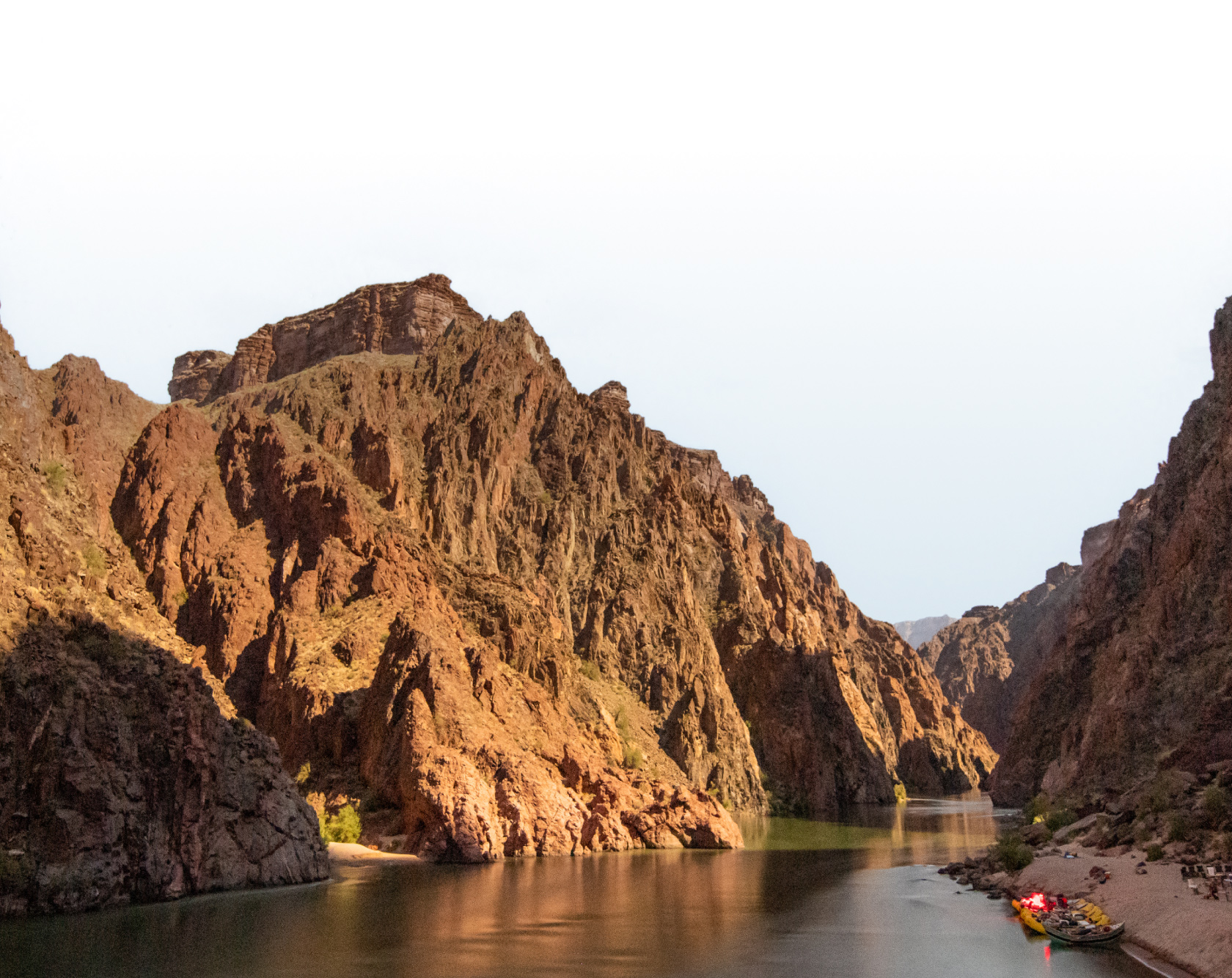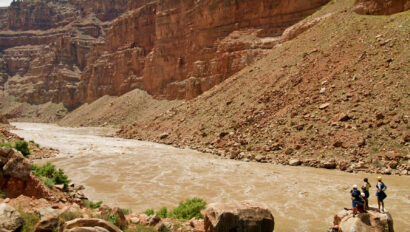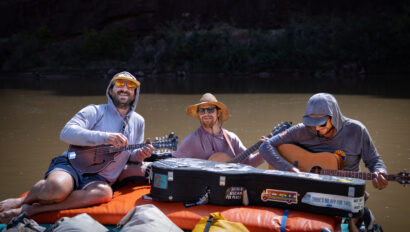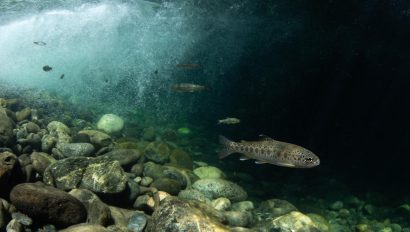River of Eden

The Navua River—Fiji’s Protected Gold
As we float over inky black, polished boulders, hanging vines dangling hundreds of feet above us, time stops. Actually, it moves backwards a few million years. I swear. It just doesn’t seem plausible that this ‘river of Eden’—this miniature, tropical Grand Canyon—exists in our modern world. I keep blinking, wondering if my lingering jetlag is responsible for this Jurassic-like mirage.
We glide into the jaws of the canyon ahead and emerald waters roil beneath our boat. I expect T-Rex to appear, flashing his teeth, any second.
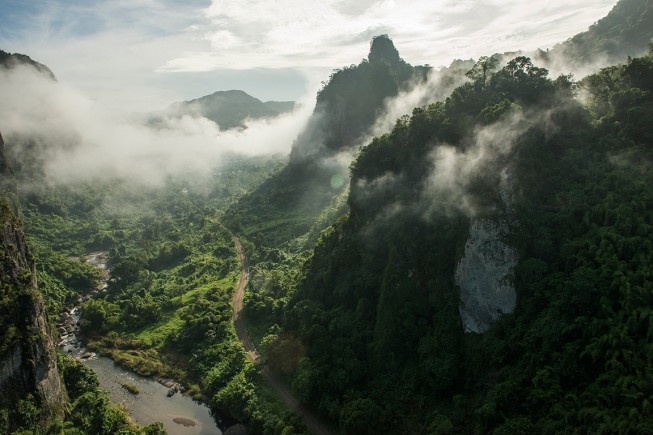
“Welcome to my office,” Says Moses, rowing our 14-foot yellow raft. He sits in the back smiling ear-to-ear, arms rippling. His view from the world’s executive river suite is, well, jaw-dropping. For Moses, this river is also his and you can tell. He knows every inch of it. As he rows, he consistently sings to himself, or anyone in earshot, about rowing, the river’s current and the folklore of his culture.
Starting in the crumpled hills of Fiji’s Viti Levu’s volcanic heart, the largest island of the Fijian archipelago runs this hidden gem—the Navua River.
I’ve been lucky to see my share of rivers across six continents and I’ve even chased a few sources to sea. So I’ve seen a few river sights: snowmelt exploding from glaciers, water dancing down cliffs, even currents vanish into the sucking thirst of deserts. All of it in some form leaves behind an array of river sculpture on the history of our blue planet. Having seen such diverse river geography, I didn’t expect to find the unexpected here—on an island in the South Pacific.
A few river rats had warned me I was in for a visual shock. But I guess I didn’t really believe them or listen that well. In truth, however, nothing could have prepared me for a passage through time down this river that locals say connects them to their ancestors.
Nate Bricker, a river-runner who made some of the earliest descents on the Navua River in the late 90’s with his wife Kelly, says, “In the rainy season, you can’t be out of sight of a waterfall and bars of light come through the canopy that is nothing short of a laser show—in nature.” When Nate told me that over the phone, I thought he was exaggerating. He had to be, right? I chalked it up to a fish story of sorts, or a river tale if you will.
I hadn’t met Nate, nor seen the Navua yet.
On the first two miles of my trip down the Upper Navua, I quickly realize Nate is an understated man. Slicing through the island’s tropical highlands, the Upper Navua gorge is unparalleled. Sheer walls rocket 150-feet skyward as green, roiling waters sleuth through 20-footwide natural canals. Waterfalls and a misty spray dance from the jungle above, keeping this oasis gurgling and glistening with life. A light show wouldn’t hold a candle to this wilderness of refracted rays.
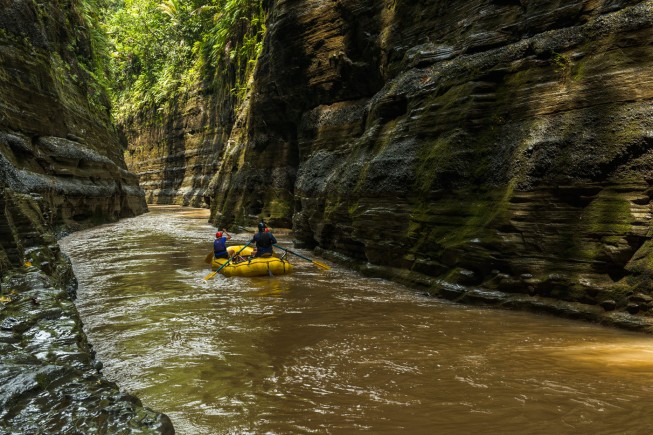
Beyond the jaw-dropping beauty, something else lured me here. The Upper Navua River is protected. And that is unusual for these parts. In fact, the Navua represents one of the most unique conservation cooperatives in the world, which prevents logging, mining or roads within 200 meters from either side of the river’s lapping waters. Created in 2000 by Rivers Fiji—a rafting company Nate and Kelly started in 1998, with George Wendt, late founder of OARS—and an alliance of nine local land-owning families, two villages, a logging company and a government entity, it is one of the only protected rivers in the South Pacific.
That may not sound so unusual, but keep in mind that in the developing world natural resources are often the quickest ticket to economic development. Or at least, that is the sales pitch communities in places like Fiji constantly hear: sell your timber, mine your resources, control your river—and money will follow. For most, especially those living hand to mouth, that is a tough sales pitch to say no to.
Elizabeth Erasito, the director of Fiji’s Natural Trust—an organization that looks after the natural and cultural history, sums up the challenge well. “Any third world government feels they have to say yes to outside investments for mining or timber, the money is just too great.” As a native Fijian, Erasito knows the dilemma well and she has seen development stomp through her country. But she maintains a long-term perspective. “Although the lure is often too great to say no to development, the short term benefits will never outweigh the long term damage.”
Remarkably, the small villages that line the Upper Navua did just that—they said, “No.” They looked into the future and decided that a flowing Navua River, lined with jungle, is more valuable in the long term than any immediate profits from timber, gravel or even a dam project which some investors have explored as a possibility in the area.
“Dig through the conservation area and you will find your gold,” Erasito proudly says referring to the Navua RAMSAR listing—an intergovernmental treaty between member countries to maintain the ecological character of wetlands of international importance.
This long-term decision making and RAMSAR listing was nudged along by the efforts of a few intrepid river runners. And the beauty is that Nate and Kelly Bricker, those river lovers who figured out how to run the Upper Navua, didn’t come in and preach conservation or environmentalism. They just showed the local Fijians what was in their backyard.
“At first, the elders didn’t believe us. They said a river like the Navua only existed in New Zealand or beyond,” Nate says, his eyes twinkling as he recalls the infancy of Rivers Fiji.
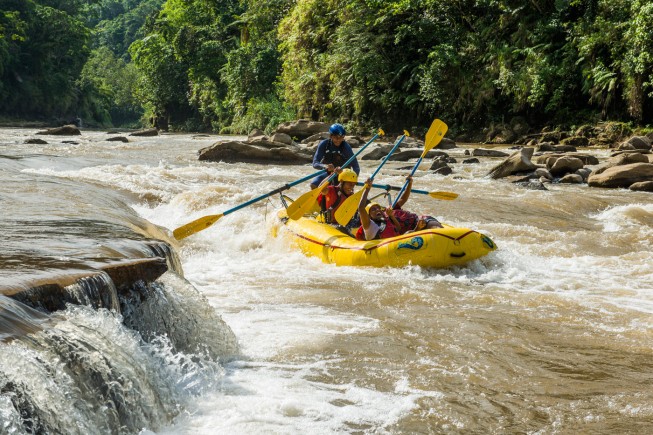
Eventually a few younger villagers convinced the elders Nate and Kelly weren’t crazy. A hidden slot canyon existed somewhere out there in a landscape Nate describes as “tortured.”
“Once we got them to join us on a raft trip the elders acted very stoic and stern like Fijian men do. But once we entered the slot canyon, they splashed and giggled like little kids,” Nate says, restraining his own giddiness.
Kelly says, “I’ve never seen Fijian men act so free in my 16-plus years working here.”
Thanks to the persistence of the Brickers and their partners, Rivers Fiji continues today and all the guides are local Fijians from clans or “Mataqali” who have a stake in the conservation area. Tourists can run day trips down the upper gorge, which boasts one of the longest navigable slot canyons in the world, roughly 10-miles long. And when guides like Moses aren’t singing or laughing, they are sharing the legends of warfare and love that appear to be intertwined with the history of every corner of the river.
Each river bend offers a new hidden, velvet gorge that beckons exploration. We spend one glorious hot, rainy day gliding up one to find an amphitheater where two 100-foot falls weave together in a stately, polished palace. The roar of tropical cascades echoes throughout the tight canyon and inside my head. The beauty is almost haunting.
Soaking wet, I stand gazing upward at the metronome rhythm of the falls crashing down on my face. It comes in waves—light caressing splashes then thumping bursts. When I step out from the torrent, I see Moses and another guide Basilio dancing, singing and hollering in joy under the other cascade. I holler at them and we all giggle like children, uncontrollably. The laughter is muted by the magical sound of rushing, green water and mist that surrounds us. I can’t believe such a place exists—today or any era before. It rivals any Hollywood special effects studio.
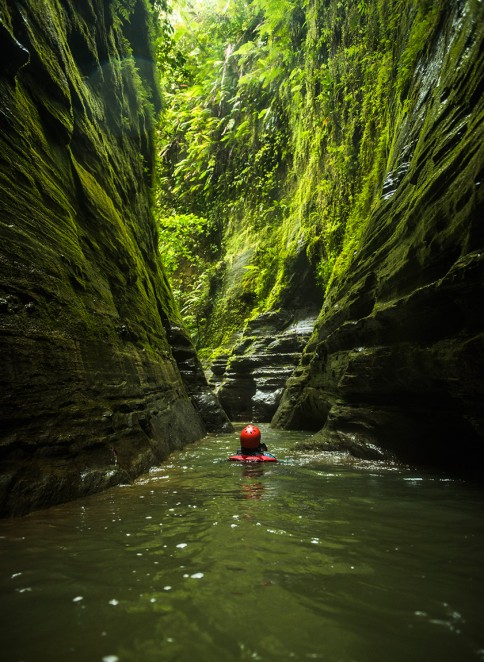
We float down the miniature tributary in our lifejackets to our rafts waiting on the larger Navua. Our waterfall tributary, as remarkable and unbelievable as it is, is just one of 53 mapped tributaries within the Upper Navua Conservation Area. I realize I would need a year, or more likely, a lifetime, to explore a fraction of this landscape.
As we move downstream we near the villages of Waibogi and Wainadiro and we start to see locals fishing for prawns and eels, mostly women. Everyone waves and hollers “Buuula” (hello) from the shore. Moses starts to sing again, this time for the women on the banks it seems. Everyone seems to know him.
Before I arrived, I heard stories that a Chinese company was the one looking to dam the Navua or possibly the neighboring Namosi Valley to store water for a copper mine. I find little information about the proposal and Fijians are leery to discuss it in detail—fear perhaps. As we float downstream, I ask Basilio, who is paddling an inflatable kayak if he thinks the rumor is true and if so, if it could happen.
Before he answers an explosion of screams erupts downstream. Just ahead I see a posse of kids running, screaming and jumping into the river. At first I think they are trying to get our attention but then I notice, as we float closer, they are playing their national sport, rugby, in the river. A mix of teenage boys and girls are producing an orchestra of laughter as they run, pass, dive and tackle on a sandy beach.
We exchange “Buuuulas” and they keep playing. Then Basilio says, “I don’t think the local communities would vote for a dam. They have voted for this—to keep this river like this.” We paddle into a wider stretch of river, roughly 100 feet now and another waterfall appears.
“We just need to keep showing these kids the river,” Basilio adds, “so they can thank their elders for protecting it. The river is our friend—it gives us work and beauty but we have to respect it.”
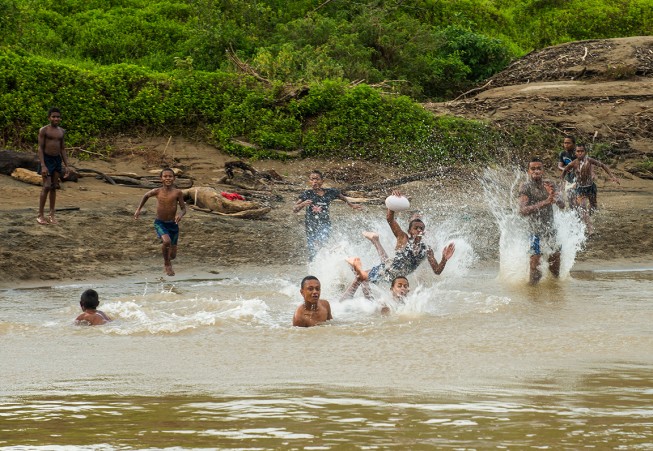
As a river lover, I didn’t expect to encounter such a mine of river magic. Surf, sun and sand form the typical Fijian vision I’d expected. Class II / III rapids, endless laughter and a world-class conservation site? Never crossed my mind.
After one trip down the Upper Navua Gorge, I realize you don’t have to dig very deep in this conservation site to find gold. It surrounds you and communities and clans that serve as the stewards of this watery wonderland.
Since resource demands for timber and minerals continue to offer quick, short-term economic boons for small island governments—the Navua is not entirely safe. Stories of bandit timber operations are abundant.
People have started to realize a healthy Navua means a healthy Fijian coast too.
Brandon Page, a scuba-diving outfitter in Beqa Lagoon near the mouth of the Navua River’s delta sees direct effects on the sea depending on the state of the rivers. If an area gets logged, heavy rains result in siltation skyrocketing and visibility for diving plummets.
Page started his business 16 years ago because of the abundance of soft corals, wrecks, and high shark populations and of course the clarity of the Fijian waters. Today he says increased siltation loads are pouring down from poorly managed timber sites and those corals are getting buried, suffocating and dying.
“The health of our dives is related to the health of our rivers. I now cancel dive days because the visibility is so low—even 10 nautical miles out to sea.”
Page points to the unprotected regions of the lower Navua and other drainages where legal and illegal logging is rampant.
“This is a third world country, everyone like everyone else in the world wants to improve their lives here and if you have some guy waving a wad of cash around they will hack down any forest irrespective of the damage it is doing.”
For Page, the Upper Navua Conservation Area, the region protected by the RAMSAR listing, is a “standout.” He says it is the perfect model where “people can see if you leave the forest alone, tourists will come and there are lots of beneficial spin-off effects from that. There are no positives to a lot of deforestation in this country.”
On my last day visiting the Navua River system, I get the chance to fly over the river. I am still reeling from my giggle attacks while floating the upper gorge and the aerial perspective gives greater clarity to how unique this river is. From the air, I can barely see the slot canyon in the upper canyon. It hides somewhere beneath the canopy. What is visible is the swath of untouched forest that shadows the Navua and the quaint villages tucked along its banks.
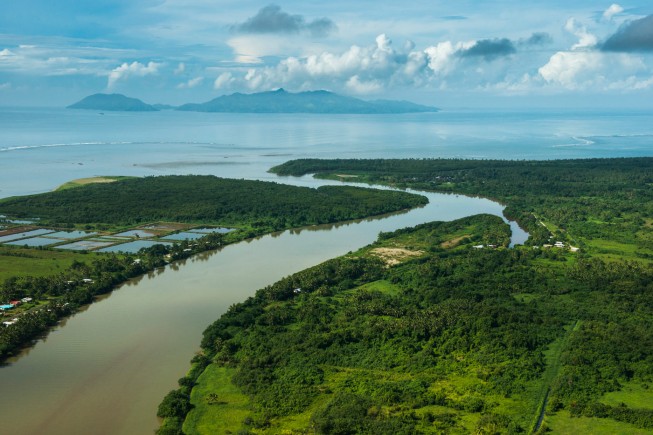
As soon as the Navua leaves its upper, secretly protected nook, it stretches through tropical hills to the sea. The current is more visible but so too are the gravel pits and patches of cleared forest. Below one gravel pit, the river’s color is visibly redder. The hillside appears to be bleeding into the river.
Before we land, we fly over the delta and the Navua mouth. A large swath of brownish sand fans out into the ocean—that scubadiver playground. There is a clear demarcation where silted water meets the turquoise South Pacific. From the air I marvel at the threshold. It makes me wonder if the Navua’s unique conservation plan could ever extend further downstream.
Before I depart, I say goodbye to the Rivers Fiji guides as they pack for another trip—this time taking local kids down their river “to show what their elders left for them,” Basilio says. It is a regular event. Not only does Rivers Fiji organize river trips for clan elders and kids, but they also support the community by giving dividends back to the villagers. For every tourist that visits their wondrous realm, local residents receive a total of $33 Fijian per paddler. I’m inspired to see an ecotourism operation walking its talk or paddling its raft, if you will. I tell the kids to whoop, holler and giggle as loudly as possible when they travel through their own Jurassic Park. I know I did, and I suspect they will too. It is impossible not to when you float the Navua.
And thankfully that echo of laughter inside the Navua gorge, one of the prettiest rivers in the world, will keep it flowing as it has since ancient times—like locals on both banks, and the river, prefer.
Want to see more from Pete’s journey? Watch his short film, River of Eden.
Related Posts
Sign up for Our Newsletter
